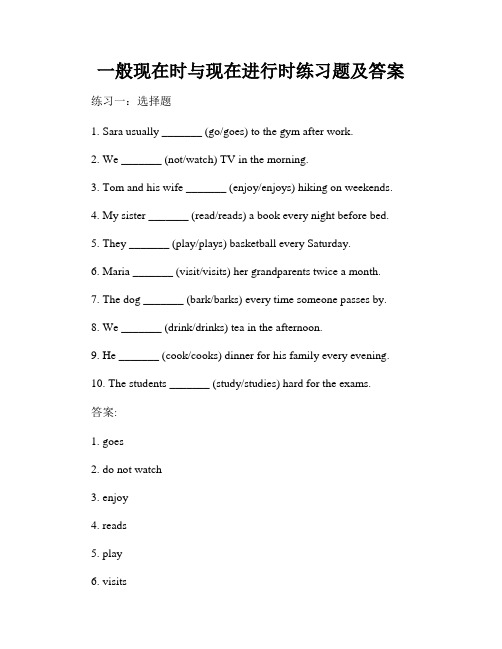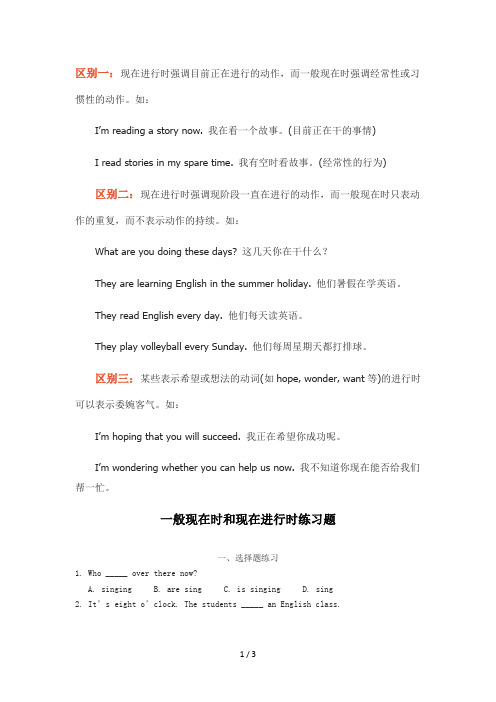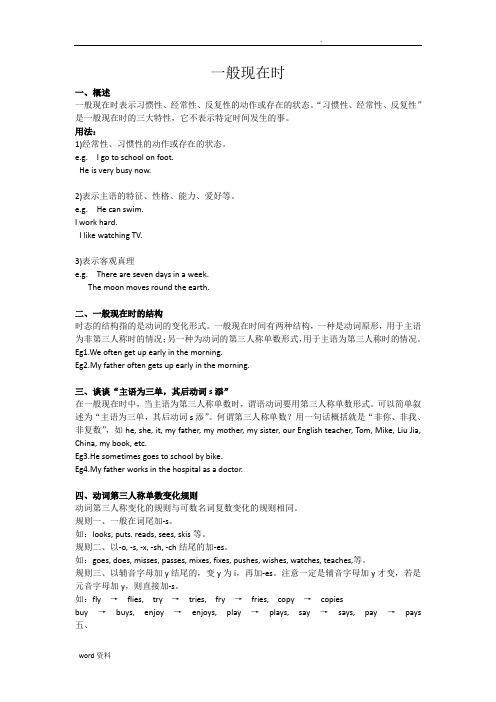初中语法一般现在时和现在进行时讲解练习含答案
(完整版)初中语法一般现在时和现在进行时讲解、练习含答案

一般现在时:一、定义与讲解:一般现在时表示经常或习惯性的动作或一般性事实。
,也可表示现在的状态或主语具备的性格和能力。
通常与副词every day(每天),always(总是),usually(通常),often (经常)sometimes(有时),等时间状语连用。
例:(1)表示事物或人物的特征、状态。
The sky is blue.天空是蓝色的。
Mary’s father is an English teacher. 玛丽的爸爸是一名英语老师。
(2)表示经常性或习惯性的动作。
I get up at six every day.我每天六点起床。
She plays sports every day. 她每天都做运动。
(3)表示客观现实。
The table has four legs.桌子有四条腿。
There are 50 students in my class. 我们班有50个学生。
(4)表示客观真理,科学原理,自然现象,等客观事实或格言谚语等。
The sun rises in the east every day.太阳每天从东方升起。
The earth goes around the sun.地球绕着太阳转。
(5)表示平日的喜好。
I like bananas. We don’t like vegetables.He likes ice cream. She doesn’t like strawberries.二.只有主语在第三人称单数时用动词的“三单形式”,其他人称用动词原形。
★动词三单形式的变化规则:1.(1)多数直接在动词词尾加-s.play — plays like — likesask---asks work---works get---gets call---calls(2)以字母s, x, ch, sh或o结尾的动词,在词尾直接加-es.watch---watches wish---wishes do---does go---goes (3)以“辅音字母加 - y”结尾的动词,要先变y为i再加-es.try---tries study---studies cry---cries fly---flies2.不规则变化:be---- is have----has三、一般现在时的句子转换:(1)变一般疑问句:当句子中有be动词或情态动词时,则把be动词或情态动词(can,could等)提到主语的前面,(口诀:一调二变三问号);(2)变否定句:在be动词或情态动词后面直接加not变成否定句. (be后not 莫忘记)例:①陈述句:She is my sister..疑问句→ Is she your sister? Yes, I am./ No, I’m not.否定句→ She is not my sister.②陈述句:I can play soccer.疑问句→ Can you play soccer? Yes,Ican./ No, I can’t.否定句→ I can not /can’t play soccer.★注意:对一般疑问句的回答:一般用什么问就用什么来回答。
初中一般现在时与现在进行时语法详解及习题

初中一般现在时与现在进行时语法详解及习题第一篇:初中一般现在时与现在进行时语法详解及习题一般现在时一、概述一般现在时表示习惯性、经常性、反复性的动作或存在的状态。
“习惯性、经常性、反复性”是一般现在时的三大特性,它不表示特定时间内发生的事。
用法:1)经常性、习惯性的动作或存在的状态。
e.g.I go to school on foot.He is very busy now.2)表示主语的特征、性格、能力、爱好等。
e.g.He can swim.I work hard.I like watching TV.3)表示客观真理e.g.There are seven days in a week.The moon moves round the earth.二、一般现在时的结构时态的结构指的是动词的变化形式。
一般现在时间有两种结构,一种是动词原形,用于主语为非第三人称时的情况;另一种为动词的第三人称单数形式,用于主语为第三人称时的情况。
Eg1.We often get up early in the morning.Eg2.My father often gets up early in the morning.三、谈谈“主语为三单,其后动词s添”在一般现在时中,当主语为第三人称单数时,谓语动词要用第三人称单数形式。
可以简单叙述为“主语为三单,其后动词s添”。
何谓第三人称单数?用一句话概括就是“非你、非我、非复数”,如he, she, it, my father, my mother, my sister, our English teacher, T om, Mike, Liu Jia, China, my book, etc.Eg3.He sometimes goes to school by bike.Eg4.My father works in the hospital as a doctor.四、动词第三人称单数变化规则动词第三人称变化的规则与可数名词复数变化的规则相同。
(完整版)一般现在时和现在进行时练习题(含答案)

3. Listen! The baby
in the next room.
A. crying B. cried C. is crying D. cries
4. Look! The twins
new sweaters.
A. are wearing B. wearing C. are wear D. is wearing
do
match
catch
4.study
fly
cry
play
5. have
五、根据中文意思完成句子
1、学生们在干什么?有一些在打电话,另一些躺在教室里。
the students
? Some
on the phone,
2、“格林先生在看电视吗?” “不, 他在打扫房间。”
in the classroom.
1. My father always
(come) back from work very late.
2. The teacher is busy. He
(sleep) for six hoursa day.
3. Listen! Joan
(sing) in the classroom. She often
music and often
to music.
A. like/ listen B. likes/ listens C. like/are listening
9. She
upatsix in the morning.
A. get B. gets C. getting
10. OnSundays he sometimes
一般现在时与现在进行时练习题及答案

一般现在时与现在进行时练习题及答案练习一:选择题1. Sara usually _______ (go/goes) to the gym after work.2. We _______ (not/watch) TV in the morning.3. Tom and his wife _______ (enjoy/enjoys) hiking on weekends.4. My sister _______ (read/reads) a book every night before bed.5. They _______ (play/plays) basketball every Saturday.6. Maria _______ (visit/visits) her grandparents twice a month.7. The dog _______ (bark/barks) every time someone passes by.8. We _______ (drink/drinks) tea in the afternoon.9. He _______ (cook/cooks) dinner for his family every evening.10. The students _______ (study/studies) hard for the exams.答案:1. goes2. do not watch3. enjoy4. reads5. play6. visits7. barks8. drink9. cooks10. study练习二:用适当的动词形式填空1. I usually _______ (read) a book before bed.2. Look! The sun _______ (shine) brightly in the sky.3. My parents _______ (watch) TV every evening.4. They _______ (not go) to the park on Sundays.5. Sara _______ (drink) a cup of coffee every morning.6. The bus _______ (arrive) at 8 o'clock every day.7. We _______ (play) soccer on Saturdays.8. Jenny _______ (not eat) meat. She's a vegetarian.9. The children _______ (love) to play in the playground.10. Tom _______ (always be) late for school.答案:1. read2. is shining3. watch4. do not go5. drinks6. arrives7. play8. does not eat9. love10. is always。
一般现在时和现在进行时练习题(含答案)

区别一:现在进行时强调目前正在进行的动作,而一般现在时强调经常性或习惯性的动作。
如:I’m reading a story now. 我在看一个故事。
(目前正在干的事情)I read stories in my spare time. 我有空时看故事。
(经常性的行为)区别二:现在进行时强调现阶段一直在进行的动作,而一般现在时只表动作的重复,而不表示动作的持续。
如:What are you doing these days? 这几天你在干什么?They are learning English in the summer holiday. 他们暑假在学英语。
They read English every day. 他们每天读英语。
They play volleyball every Sunday. 他们每周星期天都打排球。
区别三:某些表示希望或想法的动词(如hope, wonder, want等)的进行时可以表示委婉客气。
如:I’m hoping that you will succeed. 我正在希望你成功呢。
I’m wondering whethe r you can help us now. 我不知道你现在能否给我们帮一忙。
一般现在时和现在进行时练习题一、选择题练习1. Who _____ over there now?A. singingB. are singC. is singingD. sing2. It’s eight o’clock. The students _____ an English class.A. haveB. havingC. is havingD. are having3. Listen! The baby _____ in the next room.A. cryingB. criedC. is cryingD. cries4. Look! The twins _____ new sweaters.A. are wearingB. wearingC. are wearD. is wearing5. Don’t talk here. Grandparents _____.A. is sleepingB. are sleepingC. sleepingD. sleep6. Tom is a worker. He _____ in a factory. His sisters _____ in a hospital.A. work/ workB. works/ workC. work/ works7. Who _____ English best in your class?A. speakB. speaksC. speaking8. Mrs Read _____ the windows every day.A. is cleaningB. cleanC. cleans9. We _____ music and often _____ to music.A. like/ listenB. likes/ listensC. like/ are listening10. She _____ up at six in the morning.A. getB. getsC. getting11. On Sunday he sometimes _____ his clothes and sometimes _____ some shopping.A. wash/ doB. is washing/ is doingC. washes/ does12. The twins usually _____ milk and bread for breakfast, but Jim _____ some coffee for it.A. have/ haveB. have/ hasC. has/ have13.Father usually ______ his newspaper after dinner.A. readB. readsC. ReadingD. is reading14. The Blacks often ______ to the cinema on Saturday evenings.A. goB. goesC. is goingD. are going15.Look! The boy ______ with his mother in the pool.A. is swimmingB. is swimingC. are swimmingD. are swiming16.--- What is Tom doing in the classroom--He ______ something on the blackboard.A. drawsB. drawC. is drawingD. are drawing.17.Old Tom usually ______ up at six and ______ sports in the garden.A. gets, dosB. gets, doesC. get, doesD. gets, do18. It's ten o'clock and Jack ______ still(仍然) ______ his homework.A. is, doB. is, doingC. are, doD. are, doing19. The waiters ______ to work at five every morning.A. startB. StartsC. StartingD. are starting20.I ______ a letter, so I can't go out with you.A. is writingB. am writingC. am writeingD. am writting二、填空:1. My father always __________(come) back from work very late.2. The teacher is busy. He __________ (sleep) six hours a day.3. Listen! Joan __________(sing) in the classroom. She often __________ (sing) there.4. __________ your brother __________(know) Japanese?5. Where __________ you __________ (have) lunch every day?6. The girl __________(like) wearing a skirt. Look! She __________(wear) a red skirt today.三、写出下列动词的现在分词形式1. work_____ sing_____ play____ study_____2. dance_____ have____ write____ take_____3. run_____ sit____ shop____ swim____4. lie_____四、写出下列动词的第三人称单数形式1.work_____ read____ clean____ write____2.teach____ wash____ guess____ watch____3.go______ do______ photo_____4.study____ fly_____ cry____ play____5.have____。
初中一般现在时与现在进行时语法详解及习题

一般现在时一、概述一般现在时表示习惯性、经常性、反复性的动作或存在的状态。
“习惯性、经常性、反复性”是一般现在时的三大特性,它不表示特定时间发生的事。
用法:1)经常性、习惯性的动作或存在的状态。
e.g. I go to school on foot.He is very busy now.2)表示主语的特征、性格、能力、爱好等。
e.g. He can swim.I work hard.I like watching TV.3)表示客观真理e.g. There are seven days in a week.The moon moves round the earth.二、一般现在时的结构时态的结构指的是动词的变化形式。
一般现在时间有两种结构,一种是动词原形,用于主语为非第三人称时的情况;另一种为动词的第三人称单数形式,用于主语为第三人称时的情况。
Eg1.We often get up early in the morning.Eg2.My father often gets up early in the morning.三、谈谈“主语为三单,其后动词s添”在一般现在时中,当主语为第三人称单数时,谓语动词要用第三人称单数形式。
可以简单叙述为“主语为三单,其后动词s添”。
何谓第三人称单数?用一句话概括就是“非你、非我、非复数”,如he, she, it, my father, my mother, my sister, our English teacher, Tom, Mike, Liu Jia, China, my book, etc.Eg3.He sometimes goes to school by bike.Eg4.My father works in the hospital as a doctor.四、动词第三人称单数变化规则动词第三人称变化的规则与可数名词复数变化的规则相同。
规则一、一般在词尾加-s。
现在进行时和动词一般现在时解析对比以及练习2023-2024学年七年级上册英语

现在进行时&一般现在时(知识对比讲解)一、定义对比现在进行时:★表示现在或现阶段正在进行/发生的动作或存在的状态例:I am doing homework.He is running.一般现在时:★表示经常性/习惯性/规律性/真理性的动作或存在的状态例:I usually go to school by bike.I am a teacher.二、标志词对比现在进行时的标志词:◆now◆right now◆look◆listen◆at this/the moment一般现在时的标志词:◆often/usually/always/sometimes等频率副词◆every day/night/morning等三、相关动词形式的变化规则现在进行时中,现在分词(动词加ing)的变化规则◆一般情况下,直接加ing如:sleep → sleeping look → looking◆以不发音的字母e结尾,去e,加ing如: e → ing have → having◆以重读闭音节结尾,双写尾字母,加ing如:put → putting swim → swimming runrunning shopshopping ◆特殊变化:lielying diedying一般现在时中,行为动词变三单的变化规则◆一般情况下,加s如:look → looks want → wants◆以s、x、o、ch、sh结尾,加es如:go→ goes watch → watches◆以辅音字母+y结尾,变y为i,再加es如:fly → flies study → studies◆特殊变化如:have → has四、句型结构对比现在进行时的句型结构:1> 肯定句:主语+be +动词ing +其他.如:They are running now.2> 否定句:主语+ be+not +动词ing +其他.如:They are not running now.=They aren't running now.3> 一般疑问句:Be + 主语+动词ing +其他?如:Are they running now?4> 特殊疑问句:特殊疑问词+ be +主语+动词ing +其他?如: What are they doing now?一般现在时的句型结构:第一种:含be型1> 肯定句:主语+be +其他.如:She is in the room.2> 否定句:主语+ be+not +其他.如:She is not in the room.=She isn't in the room.3> 一般疑问句:Be + 主语+其他?如:Is she in the room?4> 特殊疑问句:特殊疑问词+ be +主语+其他?如: Where is she?第二种:含实义动词型1> 肯定句:主语+动词+其他.如:I like reading.(主语I不符合三单,动词like用原形)She likes reading.(主语She符合三单,动词like变三单)即:● 肯定句中,主语三单,动词变三单。
初中英语一般现在时与现在进行时对比完形填空题30题答案解析版

初中英语一般现在时与现在进行时对比完形填空题30题答案解析版1My name is Lily. I am a middle school student. I usually get up at seven o'clock in the morning. Then I brush my teeth and wash my face. After that, I have breakfast. I often eat bread and drink milk. I go to school by bike. At school, I have many classes. I like English very much. Sometimes I read English books in the library. Now, I am sitting in the classroom and listening to the teacher.1. I usually ___ up at seven o'clock in the morning.A. getB. getsC. am gettingD. got答案:A。
一般现在时中,主语是I,谓语动词用原形。
B 选项是第三人称单数形式;C 选项是现在进行时;D 选项是一般过去时。
2. I often eat bread and drink milk. This is a description of ___.A. present continuous tenseB. past continuous tenseC. simple present tenseD. future tense答案:C。
“I often eat bread and drink milk.”是一般现在时的描述。
A 选项是现在进行时;B 选项是过去进行时;D 选项是将来时。
- 1、下载文档前请自行甄别文档内容的完整性,平台不提供额外的编辑、内容补充、找答案等附加服务。
- 2、"仅部分预览"的文档,不可在线预览部分如存在完整性等问题,可反馈申请退款(可完整预览的文档不适用该条件!)。
- 3、如文档侵犯您的权益,请联系客服反馈,我们会尽快为您处理(人工客服工作时间:9:00-18:30)。
初中语法一般现在时和现在进行时讲解练习含答案一般现在时:一、定义与讲解:一般现在时表示经常或习惯性的动作或一般性事实。
,也可表示现在的状态或主语具备的性格和能力。
通常与副词every day(每天),always(总是),usually (通常),often(经常)sometimes(有时),等时间状语连用。
例:(1)表示事物或人物的特征、状态。
The sky is blue.天空是蓝色的。
Mary’s father is an English teacher. 玛丽的爸爸是一名英语老师。
(2)表示经常性或习惯性的动作。
I get up at six every day.我每天六点起床。
She plays sports every day. 她每天都做运动。
(3)表示客观现实。
The table has four legs.桌子有四条腿。
There are 50 students in my class. 我们班有50个学生。
(4)表示客观真理,科学原理,自然现象,等客观事实或格言谚语等。
The sun rises in the east every day.太阳每天从东方升起。
The earth goes around the sun.地球绕着太阳转。
(5)表示平日的喜好。
I like bananas. We don’t like vegetables.He likes ice cream. She doesn’t like strawberries.二.只有主语在第三人称单数时用动词的“三单形式”,其他人称用动词原形。
★动词三单形式的变化规则:1.(1)多数直接在动词词尾加-s. play — playslike — likesask---asks work---works get---gets call---calls(2)以字母s, x, ch, sh或o结尾的动词,在词尾直接加-es.watch---watches wish---wishes do---does go---goes(3)以“辅音字母加 - y”结尾的动词,要先变y为i再加-es. try---tries study---studies cry---cries fly---flies 2.不规则变化:be---- is have----has 三、一般现在时的句子转换:(1)变一般疑问句:当句子中有be动词或情态动词时,则把be动词或情态动词(can,could等)提到主语的前面,(口诀:一调二变三问号);(2)变否定句:在be动词或情态动词后面直接加not变成否定句. (be后not莫忘记) 例:①陈述句:She is my sister..疑问句→ Is she your sister? Yes, I am./ No, I’m not. 否定句→ She is not my sister. ②陈述句:I can play soccer.疑问句→ Can you play soccer? Yes,Ican./ No, I can’t.否定句→ I can not /can’t play soccer. 注意:对一般疑问句的回答:一般用什么问就用什么来回答。
但以下例外:Is this a pencil? Yes , it is./ No, it isn’t. Is that your backpack? Yes , it is./ No, it isn’t.Are these your parents? Yes, they’re./ No, they aren’t. Are those Jim’s brothers? Yes, they’re./ No, they aren’t. (3)当句子中没有be动词,也没有情态动词时,变一般疑问句时,在主语前加助动词do (I, we, you,以及复数), does(第三人称单数she,he,it等)变成问句;(4)变否定句时,在主语后谓语动词前加助动词don’t, doesn’t变成否定句,切记:助动词后的动词则还原成动词原形。
例:①陈述句:We get up(起床)at 7:00 every morning. 疑问句→Do you get up at7:00 every morning? 否定句→We don’t get up at 7:00 every morning. ②陈述句:She has a brother.疑问句→ Does she have a brother? 否定句→ She doesn’t have a brother.※在一般现在时中,当主语是第三人称单数时,谓语动词要用第三人称单数形式,即常在动词原形后加-s或-es。
但有些同学们对于哪些主语是第三人称单数还不十分清楚,现归纳总结如下:一、人称代词he, she, it是第三人称单数。
如: He likes watching TV. 他喜欢看电视。
She has lunch at twelve. 她十二点吃午餐。
二、单个人名、地名或称呼作主语;是第三人称单数。
如:①Han Mei likes salsd . 韩梅喜欢萨拉。
②Beijing is in China. 北京在中国。
③Uncle Wang often plays volleyball.. 王叔叔经常打排球。
三、单数可数名词或\单数可数名词\作主语时,是第三人称单数。
如:②This book is yours. 这本书是你的。
③That car is red. ④The cat is Lucy's. 这只猫是露茜的。
四、不定代词someone, somebody, nobody, everything, something等及指示代词this, that作主语时,是第三人称单数。
①Everyone is here. 大家到齐了。
②There is a watch on the table. 桌上有块手表。
③This is a pen. 这是一支钢笔。
④That is an eraser. 五、不可数名词作主语时为第三人称单数。
如:①The milk(牛奶)is in the glass. 牛奶在玻璃杯里。
②The bread is very small. 那面包很小。
六、当数字或字母作主语时,看作第三人称单数。
如:①\是个吉利数字。
②\是个字母。
一、按照要求改写句子1.This is my pencil ? (变一般疑问句)your pencil ? 2. These red socks are Kate’s . (变一般疑问句) socks Kate’s ?3. Mary does not have any books . (变肯定句) some books .4. She likes the black bag very much . (变为否定句)5. I like apples. (用she改写句子)6. It’s an English dictionary . (对画线部分提问) .7. He has hamburger and apples for dinner . (变一般疑问句)二、用Be动词填空。
1. you Li Fen ? No, not .2. Mr. green very busy? Yes , he .3..This book very interesting .4. What class you in ?5. You and I good friends .6. The basketball club fun .三.用所给动词的适当形式填空。
1. Lin Tao (like) his ruler .2. Let’s (have) ice cream .3. Let’s (play) tennis !4. He (like) English.5. Nice (meet) you !6. I (need) some fruits. 一般现在时用法专练:一、写出下列动词的第三人称单数形式。
have like drink _____ go _____ stay ____ study___ _ teach_____make ______look ______have____ e_____ watch______plant_____ fly _____ do_____ 二、用括号内动词的适当形式填空。
1. He often ________(have) dinner at home.2. Daniel and Tommy _______(be) in Class One.3. We_______(not watch) TV on Monday.4. Nick ____ ___(not go) to the zoo on Sunday.5.______ they ________(like) pears?6. _______ your parents _______(have) eggs every day?7. There ________(be) some water in the bottle. 18. Mike_______(like) cooking.9. They _______(have) the same hobby. 10. Liu Tao______ _(do) not like PE.11. This boy often _______(watch) TV in the evening.五、改错(划出错误的地方,将正确的写在横线上)1. Is your brother speak English?__________________ 2. Does he likes going fishing? ________________ 3. He likes play games after class. _______________ __ 4. Mr. Wu teachs us English. _______________ 5. She don’t do her homework on Sundays. _____________ 一般现在时态句型转换This is a white key. (对画线部分进行提问)Ben’s bag is yellow and red . (对画线部分进行提问)Her name is Gina. (对画线部分进行提问)My phone number is 673-8220. (对画线部分进行提问) The b oy’s name is Jack. (对画线部分进行提问)The picture is on the wall. (对画线部分进行提问) Your baseball is under the chair. (对画线部分进行提问)His book is on the desk. (对画线部分进行提问)Some balls are in the dresser. (对画线部分进行提问)My puter is on my desk. (对画线部分进行提问)He is Johnny. (改为一般疑问句)These are his parents. (改为一般疑问句)This is my sister. (改为一般疑问句)14.The baseball is under the bed. (改为一般疑问句) 15.My key is on the bed. (改为一般疑问句)16.He has a tennis racket. (改为一般疑问句)17.I have some baseball bats. (改为一般疑问句)18.She has many things to do today. (改为一般疑问句)19.I like hamburgers . (改为一般疑问句)20.They have a TV. (改为一般疑问句)25.You are Tina. (改为否定句)26.These are my brothers. (改为否定句)27.The books are on the bookcase. (改为否定句)28.Three books are under the desk. (改为否定句)29.She has a puter game. (改为否定句)30.We have a big TV in our house. (改为否定句)31.Kate has some money in her pocket. (改为否定句)32.He likes ice cream. (改为否定句)34.Nice to meet you! (写出答语)Is that a dictionary ?(改为复数句)____________________________________________ 36These are photos. (改为单数句)37.Is he your cousin? (作肯定回答)38.Is Linda his sister? (作否定回答)39.Is this a Chinese book? (作否定回答) 40.Those are dictionaries. (改为单数句)41.Is the CD on the sofa?( 作肯定回答)42.Are the chairs next to the table ?(作否定回答)43.Where is my book ?(改为复数句子)44.They are on the sofa .( 改为单数句子)一、现在进行时的含义现在进行时是由“助动词be(am, is, are)+动词-ing”构成,表示说话者“此刻”或现阶段的行为。
